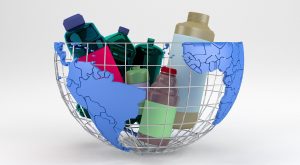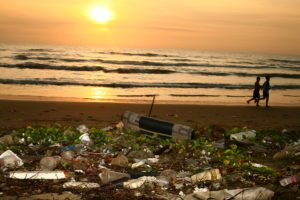Due to confinement, consumer habits have changed overnight. Especially in large cities, consumption began to shift from restaurants and school canteens to the home, which become the centre for food consumption.
As a result, the selective collection of lightweight household packaging, including plastics, cans, and cartons, has increased 15% in recent months. On the other hand, this new situation has also led to a reduction in commercial-type packaging and plastic bags in small shops, due to their closure. So, households have also taken on part of this consumption.
Decrease in demand for recycled plastic
Despite this, the consequence of COVID-19 is noticeably clear. The market for the recycling of all materials is being affected by the pandemic, being as it is a sector that provides raw materials to other industries which, in turn, have also been forced to stop or reduce their production. More specifically, the demand for recycled plastic has been negatively affected and some recyclers have even been forced to reduce their production, as indicated by the European Plastics Recyclers Association (PRE).
Therefore, the fear lies precisely in this, that the demand for recycled plastics is being reduced as a result of the circumstances due to COVID-19.
Although recycling has been considered an essential activity during confinement, ANARPLA (National Association of Plastic Recyclers in Spain) explains that if recycled plastics are no longer consumed, they accumulate in the warehouses and the recycling plants cannot continue with their activity, as they have no additional storage space.
The explanation for this increase can be found in the decrease in production at a world-wide level and the interruption, in many cases, or the decrease, in most cases, of the activity of the processing companies. These companies are usually the buyers of the majority of the recycled plastics, especially in the construction, pipe, and automotive sectors.
On the other hand, the drastic fall in the price of oil has led to a reduction in the prices of virgin plastics that compete with recycled plastics. In May, the prices of virgin polymers dropped, although it was later noticed that the price reductions were cushioned.
Increase of the plastic waste on the streets
We must also highlight a trend that is increasingly being observed on the streets: littering. This is happening, especially, since the use of protective elements, such as masks or gloves, has been recommended or become mandatory. These elements protect us from COVID-19, but part of our society does not act responsibly and discard these protective materials on the streets. We must remember that gloves and masks, after their use, must be deposited in the wastebaskets or in the garbage container for non-recyclable waste and never in the yellow container.
The recycling of plastic materials falls within the scope of the Circular Economy, which ceased to be a utopia or an ideal economic model years ago, to be formalized in specific measures. It has been proven as model that works and that should be adopted by society to ensure the preservation of the planet and ourselves. It is a model that follows a clear roadmap from which we must not deviate, despite the fact that we are going through a global health crisis.







